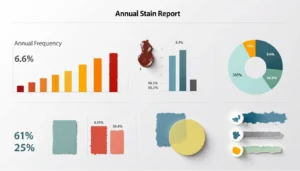Table of Contents
ToggleEveryone’s got habits, but not all of them are created equal. Good habits can feel like a superpower, giving people the energy and focus to conquer their day. On the flip side, bad habits often sneak in like that one friend who always shows up uninvited to the party. They can drain motivation and lead to chaos, leaving folks wondering where it all went wrong.
Understanding the delicate dance between good and bad habits is crucial for anyone looking to improve their life. It’s like having a personal trainer for the mind—helping to sculpt a routine that builds strength instead of weakness. So, let’s dive into the world of habits and discover how to kick those pesky bad ones to the curb while embracing the ones that make life a little brighter.
Understanding Good Habits Vs Bad Habits
Good habits contribute positively to daily routines and overall well-being. They enhance productivity, promote health, and foster mental clarity. Examples of good habits include regular exercise, adequate sleep, and mindful eating. These practices empower individuals, helping them achieve personal goals and maintain a balanced lifestyle.
Conversely, bad habits detract from personal growth and overall satisfaction. They often lead to stress, dissatisfaction, and a decline in physical and mental health. Smoking, excessive screen time, and procrastination serve as common examples of bad habits. These patterns drain energy and hinder progress, making it crucial to confront and replace them.
Identifying good and bad habits requires self-reflection and honesty. Tracking behaviors offers insight into daily choices. Many people find it helpful to journal or use apps to monitor habits, creating awareness around both positive and negative patterns.
Replacing bad habits with good ones usually takes time and effort. Setting achievable goals aids in this transition. For instance, swapping late-night snacks for healthier options proves beneficial in weight management. Gradually introducing positive behaviors can make the shift feel less overwhelming.
Cultivating good habits promotes a virtuous cycle of positivity. Engaging in uplifting activities creates a sense of accomplishment. When motivation increases, it becomes easier to maintain a focus on long-term well-being. Recognizing the power of habits thus serves as a foundation for substantial personal improvement.
Importance Of Good Habits


Good habits significantly influence one’s life, fostering personal growth and enhancing overall well-being. Embracing these habits contributes to a more fulfilling existence.
Benefits For Mental Health
Good habits play a crucial role in bolstering mental health. Regular exercise stimulates the production of endorphins, enhancing mood and reducing anxiety. Practicing mindfulness through meditation promotes emotional resilience and mental clarity. Establishing a consistent sleep routine leads to improved focus and cognitive function. Social interactions fostered by positive habits help build strong relationships, providing necessary support. Engaging in hobbies nurtures creativity, increasing overall satisfaction. These mental health benefits collectively create a stable foundation for a more balanced lifestyle.
Benefits For Physical Health
Good habits directly impact physical health as well. Maintaining a balanced diet rich in nutrients supports better immune function and energy levels. Regular physical activity helps control weight, reducing the risk of chronic diseases. Staying hydrated is essential for overall bodily functions, promoting optimal performance. Avoiding harmful habits like smoking leads to better lung health and lower the risk of numerous conditions. Prioritizing regular health check-ups ensures early detection of potential issues. Collectively, these practices form a robust strategy for enhanced long-term health.
The Impact Of Bad Habits
Bad habits significantly affect various aspects of life, leading to detrimental consequences over time. Understanding their impact can foster awareness and encourage change.
Consequences On Health
Bad habits like smoking, excessive drinking, and unhealthy eating directly harm physical health. Research indicates that smoking contributes to lung cancer and heart disease, while poor diet leads to obesity and diabetes. Mental health also suffers due to habits like substance abuse and chronic procrastination. These actions can elevate stress levels and increase anxiety, diminishing overall well-being. Regularly engaging in these behaviors accelerates health decline, making it crucial to recognize their consequences and work toward eliminating them.
Effects On Productivity
Bad habits detract from productivity, hindering personal and professional growth. Procrastinating tasks often leads to missed deadlines and increased stress. Excessive screen time diverts attention from essential responsibilities, decreasing focus. Studies show multitasking associated with bad habits reduces the overall quality of work. Poor time management can also stem from neglecting good routines, causing disorganization and inefficiency. Ultimately, recognizing and addressing these habits enhances productivity and paves the way for success.
Developing Good Habits
Cultivating good habits enhances personal growth and overall well-being.
Strategies To Build Positive Habits
Establishing a routine can strengthen positive behaviors. Start small by focusing on one habit at a time, ensuring it fits seamlessly into daily life. Setting specific, measurable, achievable, relevant, and time-bound (SMART) goals provides clear direction. Tracking progress keeps motivation high and reinforces commitment. Seeking accountability from supportive friends or family can improve success rates. Celebrating milestones, no matter how minor, encourages ongoing effort. Regularly reviewing and adjusting goals allows for flexibility and adaptation as needed.
Tools And Resources
Several tools and resources facilitate the development of good habits. Habit-tracking apps like Habitica or Streaks provide visual reminders and motivation through gamification. Journals serve as a helpful reflection space for tracking daily progress and challenges. Online communities, such as subreddit forums, offer shared experiences and support from individuals with similar goals. Books focused on habit formation, such as “Atomic Habits” by James Clear, present strategies for lasting change. Utilizing these resources fosters positive behaviors and reinforces dedication to personal improvement.
Breaking Bad Habits
Breaking bad habits involves recognizing patterns that lead to negative behaviors and implementing strategies for change.
Recognizing Triggers
Identifying triggers forms the first step in breaking bad habits. Triggers can include specific environments, emotions, or social situations that prompt undesirable actions. For instance, stress might lead someone to smoke or overeat. By journaling daily experiences, individuals can pinpoint the situations that invoke these habits. Awareness creates opportunities for intervention. Noticing these triggers enables proactive changes, allowing for healthier responses. This self-reflection provides clarity on how to navigate challenges. An understanding of triggers lays the foundation for effective habit modification.
Techniques For Change
Several techniques facilitate the replacement of bad habits with positive behaviors. Setting clear goals provides direction and motivation. Gradual change works best, as attempting drastic shifts may lead to burnout or failure. For example, starting with small steps like reducing screen time can lead to more significant changes over time. Surrounding oneself with supportive individuals enhances accountability. Engaging in mindfulness practices reduces stress and improves self-regulation. Habit-tracking apps offer visual progress, reinforcing commitment to change. Consistency proves essential; repeating positive behaviors establishes new routines. Evaluating progress regularly adjusts goals to keep moving forward.







